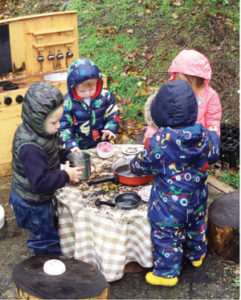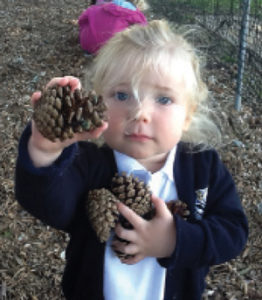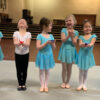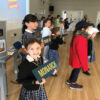
by Kirsty Keep
Head Mistress, Lancing College Preparatory School at Hove
Schools and nurseries are increasingly taking learning outside, whether by using their own outdoor space as an open-air classroom or by tackling traditional ‘woodland activities’ in natural areas or ones specifically designed for the purpose. But where do the origins of Forest School lie and how do our schools and nurseries embrace that philosophy in 2020?
The longstanding Scandinavian passion for nature is known as friluftsliv which translates as ‘open-air living’. As far back as the mid-nineteenth century, Norwegian playwright Henrik Ibsen described friluftsliv as the value to spiritual and physical wellbeing achieved by spending time outside in remote locations. So-called ‘nature schools’ began to appear in Denmark as early as the 1950s and grew in number in the 1970s when the demand for childcare rose dramatically to meet the needs of mothers returning to work while their children were very young. These early schools developed a kindergarten system that provided children with the opportunities to learn and develop in natural environments and outdoor settings. They were modelled on the work of Friedrich Fröbel, a 19th century German pedagogue and a student of Pestalozzi. Fröbel recognised that each child has unique needs and capabilities and it is no surprise that this has laid the foundation for modern early years education offered today.
These days, for our youngest children, outdoor locations tend, generally speaking, not to be particularly remote but they offer experiences that are a world away from lessons within the walls of a classroom or learning through play indoors.
School trips and visits have always given children a taste of the world beyond school but outdoor learning at school is a way of using natural resources to learn about nature. It also offers some welcome respite from the plethora of electronic resources for recreation and learning that immerse today’s children, who are born ‘digital natives’ unlike their parents, grandparents and teachers who have had to acquire digital awareness or in some cases had digital awareness thrust upon them!
Many schools and nurseries have their own garden areas where children can literally get ‘hands-on’ experience, planting seeds, watering and weeding and seeing the fruits of their endeavours grow as the seasons change. Ponds and science gardens give a myriad of opportunities for children of all ages to try their hand at pond-dipping, recording the diversity of insects and bugs visiting the gardens and operating weather stations.
However, whatever fabulous facilities a school or nursery may have on site, the possibilities for taking learning outdoors at school are endless, only limited by imagination! They can range from outdoor maths, for example counting the right angles around the school buildings and campus, creating art from nature, using twigs and leaves to make temporary pieces of art that are not only cost-free but also recyclable. Young children studying history, for example, can see for themselves just how rapidly the Great Fire of London spread by creating their own model Tudor houses from cardboard boxes, packing them into a fire pit and watching them burn. Carefully supervised by staff armed with fire extinguishers, this activity can also act as a Health & Safety lesson as to what to do in the event of a fire!
 Forest School is a more sustained, long-term process which aims through positive outdoor experiences to encourage and inspire children to love the world around them. For preschool children, Forest School nurtures their sense of wonder and their curiosity about the world outside, closely entwined with the ideals of free-flow play and learning from play that underpin the child-centred learning ethos and areas that lie at the heart of the Early Years Foundation Stage which runs from birth to five years of age. Away from their school or nursery, they have adventures in natural habitats such as woods, rivers and streams, ponds and beaches. Supervised with the lightest of touches by staff, the children have the freedom to discover what fascinates them in nature and to respond spontaneously to the environment they are exploring.
Forest School is a more sustained, long-term process which aims through positive outdoor experiences to encourage and inspire children to love the world around them. For preschool children, Forest School nurtures their sense of wonder and their curiosity about the world outside, closely entwined with the ideals of free-flow play and learning from play that underpin the child-centred learning ethos and areas that lie at the heart of the Early Years Foundation Stage which runs from birth to five years of age. Away from their school or nursery, they have adventures in natural habitats such as woods, rivers and streams, ponds and beaches. Supervised with the lightest of touches by staff, the children have the freedom to discover what fascinates them in nature and to respond spontaneously to the environment they are exploring.
Forest School is for young children of all ages; it helps babies to expand their sensory awareness, for example by feeling plants and mosses in woodland or digging up shells and pebbles on a beach. Toddlers try their hands at making camps out of logs and branches and have their first go at climbing trees or making a tyre swing. Three year olds build on their problem-solving skills by arranging logs to form a bridge to get over a stream.
For older children, there is a huge range of practical activities including bushcraft, fire-lighting, knifecraft, such as whittling and carving, how to tie knots and build shelters. Naturalist skills such as identifying plants, animal tracks and signs are eagerly embraced and children enjoy learning how to forage safely and sustainably and how to prepare and cook wild food. Who would have thought under eights would get excited by the prospect of nettle tea?
Outdoor explorers learn soft skills too that nurture critical thinking skills and teamwork. They develop empathy and sympathy with their peers and learn how to work as a team to solve problems, honing their communication and negotiation skills. The children learn to recognise and assess risks for themselves and to make choices to ensure their group’s safety. They grow in confidence and self-esteem through these hands-on experiences.
It is also an excellent way to introduce conservation activities and the ‘leave no trace’ philosophy that we should preserve wild places and leave nature as unchanged by our presence as possible, so that future generations can enjoy it too. 
Above all, it’s fun – children can get messy, get wet, climb higher and develop a love of outdoor life. They explore the natural world around them using magnifying glasses, saws, spades and buckets. This brings their learning to life and helps to create an understanding of the balance of nature and resources.
The Lancing College family includes its two Prep Schools located in Hove and Worthing, and located on the edge of the College’s 550 acre estate, a Day Nursery which opened in September 2019 and offers day care all-year round for children aged two months and over. All three provide wonderful opportunities for children to take their learning outdoors and are prime examples of nursery school pioneer Margaret McMillan’s assertion made in the mid-1920s “The best classroom and the richest cupboard is roofed only by the sky!”










